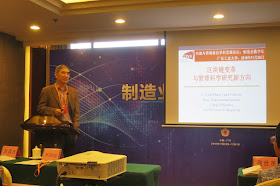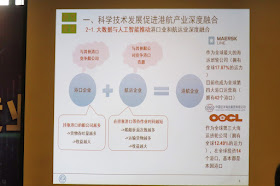I was honor to be invited as one
of guest speakers for the Mainland and Hong Kong Frontier Discipline Development
Forum - Digital Transformation and Innovation in Manufacturing (内地与香港前沿学科发展论坛:制造业数字化转型与创新) which was coorganized by
National Natural Science Foundation of China (国家自然科学基金委员会) and Beijing – Hong Kong
Academic Exchange Centre (京港学术交流中心), and
undertook by Guangdong University of Technology (广东工业大学). We have a group photo outside the venue
(Guangdong Hotel).
During Opening Ceremony, Prof. Xie
Weihong (谢卫红) (广东工业大学) gave welcome speech and introduced guest speakers.
Then Prof. Chen Weimin (陈为民) (广东工业大学副校长) gave an opening speech and he
introduced Big Data Strategic Research Institution. He expected to integrate the academic and
industry so as to contribution into “Made in China 2025”.
And then Prof. Zhan Shige (詹世革) (国家自然科学基金委员会港澳台事务办公室副主任) gave speech that she briefed the cooperation meeting between Beijing and Hong Kong since 2003. She stated today’s topic included Manufacturing, Innovation and Digitalization.
The first speaker was Prof. ZHAO
J Leon (赵建良) (香港城市大学) (Chair Professor of Information
Systems, Dept. of Information Systems, CityU) and his presentation topic
entitled “New Trends in Blockchain Transformation and Management Science” (区块链变革与管理科学研究新动向). He briefed the basic principle
of Blockchain in different logics and dimensions.
Prof. Zhao explained Blockchain was a growing list of records, called blocks, which are linked using cryptography. Therefore, it is resistant to modification of the data.
He also explained the basic
technology structure of Blockchain in the following diagram that separated into
different functional levels.
Finally, Prof. Zhao mentioned Blockchain
transformation in technology, management and society. He also quoted IBM and Walmart applied it for
food safety. At the end, Prof. Zhao
discussed Blockchain’s challenges and caused credit system.
The second speaker was Prof. Lan
hailin (蓝海林) (华南理工大学) (South China University of
Technology)and his presentation topic named “Strategic Thinking on Transformation
and Upgrading of Manufacturing Enterprises – Guangdong Xinbao Electric Co.,
Ltd. as an Example” (制造企业转型升级的战略思考—以广东新宝电器股份有限公司为例).
Firstly, Prof. Lan briefed four
basic growth strategy in China manufacturing industry that included
globalization response and market segment response. Then he briefed the core competence establishment
mechanism that depended on the organization learning capability and adaptation
of internet.
And then he mentioned the business combination and competence of Xinbao that only focused on four dimension before 2013. After 2013, they employed eight dimensions.
Finally, Prof. Lan summarized the
strategy into five dimensions and they were Product, Market, Method, Horizontal
and Positioning. He concluded that we
needed holistic deep transformation in manufacturing industry.
The third speaker was Prof. Huang
Guo Quan (黄国全) (香港大学) (Chair Professor, Department of Industrial and Manufacturing Systems
Engineering, HKU) and his topic named “Zero-Warehousing Smart Manufacturing” (零(去)仓储-制造系统).
In the beginning, Prof. Huang mentioned inventory hedges risk of manufacturing variabilities included Demand, Lead Time and Operation. Even though JIT implemented, the inventory reduced in production line but transferred to supply chain.
Therefore, Prof. Huang introduced
the Zero Warehousing Manufacturing (ZWM) through GIMS (New Mode), Practices,
Principles and Core Technologies. ZWM
Principles were Synchronized Productions included Material, Operation and
Job. He told us the idea was come from
graduation ceremony in university so that named as Graduation-Inspired Smart
Manufacturing System (GIMS).
The four speaker was Prof. Yan Haibo (匡海波) (大连海事大学) (Dalian Maritime University) and his topic entitled “Research on the Transformation and Development of China's Port and Shipping Enterprises under Big Data” (大数据背景下中国港航企业转型发展研究). Prof. Yan briefed that export trade by shipping was upto 93% in 2017.
Prof. Yan proposed to integrate Big Data/AI and Shipping industry so as to enhance efficiency and value maximization. Then he also discussed the challenges in this industry such as supply chain, value structure and environmental protection, etc.
Lastly, Prof. Yan briefed their research direction such as smart port, smart shipping, green port and sustainable development. He would like to use Big Data to establish a new industry ecosystem.
After lunch, there were two
parallel sessions and I attended the first session named “Manufacturing Digitalization
Strategy Management”.
The first speaker in Session 1
was Prof. Liu Yezheng (刘业政) (合肥工业大学) (School of Management Hefei University of Technology) and his
presentation topic named “Immersive interactive shopping environment for
personalized marketing decisions for automotive products” (沉浸式交互购物环境下面向汽车产品的个性化营销决策).
Firstly, Prof. Liu presented the
research background and raised the term iABCD that were internet plus AI plus
Big data and Cloud computing, as well as, wearable Device. Since new business model appeared under Digitalization,
Virtualization and Intelligentization, it established an immersive interactive
shopping environment.
Finally, Prof. Liu introduced his
research design and directions based on data-driven and model driven for
automotive products sale activities. He
would research on “Personalization Sale Strategy Theory” based on interactive
and behavior, interactive and prediction, as well as, interactive and decision.
I (Adjunct Professor, SEEM Dept.,
CityU) (黎剑虹) (香港城市大学) was the second speaker in
session 1 and my presentation topic was “Quality Innovation – From i4.0 to Q4.0”
(品质创新-从工业4.0至质量4.0). Firstly, I introduced the
definition and scope of Quality Innovation and its tools development trends.
Then I briefed the industry 4.0 approach based on Fraunhofer Institute for Production Technology in-house training. The Smart i4.0 Navigator (智能工业4.0导览器) was introduced.
At the end, I shared different quality
gurus’ view on Quality 4.0 and proposed the certified Quality 4.0 Professional
framework that separated into management system level, management tools level,
culture level, new technology, i4.0 and Q4.0.
The third speaker was Prof. Xiao
Jinghua (肖静华) (中山大学) (Business School of Sun Yat-Sen University) and her topic entitled “A
leap-forward transition from mass manufacturing to smart manufacturing: a case
study of Midea” (从大规模制造到智能制造的跨越式转型:美的案例). She shared her research design,
motivation, methodology and findings.
Prof. Xiao mentioned China manufacturing industry development was in parallel included mass production, lean production, soft and intelligent production. Then she employed Midea as example to study their transformation. Her study started from 2010 to now and performed interviews were 27 involved 59 people.
Finally, Prof. Xiao explained
Midea’s leap-forward transition theoretical framework to us. It showed IT driven transformation that
enhanced the effective leap-forward transition to smart manufacturing. She added the large company / group transformation
successfully that could drive their supply chain (SMEs) digital transformation.
The four speaker in this session
was Prof. CHEN Youhua Frank (陈友华) (香港城市大学) and his topic was “Discussion on assistant nursing technology for the
elderly” (长者护理辅助技术的探讨). He
firstly mentioned Elder Alarm in Hong Kong.
And then Prof. Chen briefed Embodied Conversional Agent that could employ AI with human model. He shared some results of elder-care program in Boston that alleviating loneliness.
Finally, Prof. Chen shared their
research paper named “Smooth Bayesian Network Model for the Prediction of
Future High-cost Patients with COPD” COPD stands Chronic Obstructive Pulmonary
Disease. He concluded Gerontechnology
was very significant. Virtual conversation and Robot pet combination could help
the elder.
The fifth speaker was Prof. Niu
Baozhuang (牛保庄) (华南理工大学) (South China University of Technology) and his presentation entitled “The impacts of markets and tax on
a multinational firm's procurement strategy in China” (中国市场和税制对跨境采购战略的影响).
In the beginning, Prof. Niu briefed the four types of tax structures. China’s Value-Added Tax (VAT) and VAT Refund Policies were discussed from Supplier to Domestic firms.
Finally, Consignment and Turnkey
were also discussed.
The last speaker of session 1 was
Prof. Wei Qiang (卫强) (清华大学) (Tsinghua University) and his presentation topic named “Perception and
Response: Two Thoughts on Digital Transformation and Innovation in
Manufacturing Industry” (感知与响应-制造业数字化转型与创新的两点思考).
Prof. Wei briefed the interaction between enterprise and environment through AI, Big Data and User Generated Content (UGC). Since Web 1.0 had evolution to Web 3.0, huge environment information emerged and sensing delay was possible to shorten. Then decision making was enhanced by sensing UGC.
Lastly, Prof. Wei though the
future Sense and Response relationship that AI & Robotic were more and more
significant and do it replace human?
Reference:
20181129:
Mainland and Hong Kong Frontier Discipline Development Forum - Digital
Transformation and Innovation in Manufacturing (内地与香港前沿学科发展论坛:制造业数字化转型与创新) (Part 1) - https://qualityalchemist.blogspot.com/2018/11/mainland-and-hong-kong-frontier.html
20181130:
Mainland and Hong Kong Frontier Discipline Development Forum - Digital
Transformation and Innovation in Manufacturing (内地与香港前沿学科发展论坛:制造业数字化转型与创新) (Part 2) - https://qualityalchemist.blogspot.com/2018/11/mainland-and-hong-kong-frontier_30.html




































沒有留言:
發佈留言